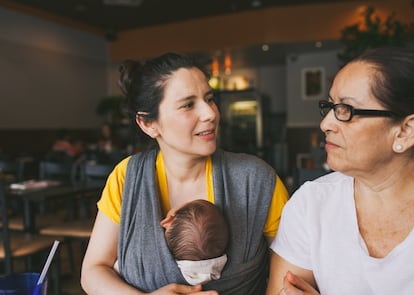Expectations, guilt and social pressure in motherhood: 9 out of 10 women feel judged
A recent study reveals that women continue to carry the burden of raising children, while those around her demand no less than perfection

Being continually judged. Feeling guilt. Having to be a perfect mother. All these sensations and feelings burden women with stress and suffering. And it does not even begin with childbirth; many become the target of criticism the moment they become pregnant, because it is precisely during pregnancy when expectations, beliefs and external pressure appear. This is the conclusion of the study “No eres menos madre” (You’re not less of a mother) presented on Wednesday, July 5, by the Club de Malasmadres organization, in which 14,000 people participated. Specifically, “9 out of 10 women often feel judged as mothers. And if we delve into where they receive the most pressure, the environment is decisive: 8 out of 10 feel criticized by their own family,” states the report.
“Where we should feel most supported, we are ruthlessly judged. In that place, the family, which should be a haven, is where we are criticized the most. At what point did we allow something like this? And this leads us to go through the upbringing alone,” explains Laura Baena, founder of Club de Malasmadres (The Bad Mothers Club), to EL PAÍS. “If we add the lack of co-responsibility of our male partners and the absence of effective public policies to avoid the great resignation of mothers, we have the perfect social context to have no future, and the birth rate is at historical lows. So yes, we urgently need more support and to be taken seriously, but in order for that to happen, it is us who have to mobilize and stop accepting a set of rules that only punish us.”
In addition, the participants in the study believe that information on parenting “makes it professional, and the demands when it comes to having children are increasing.” Baena emphasizes that “we have infinite information on each issue that concerns us at the click of a mouse. This is dangerous if we don’t know how to filter it or if we don’t approach it with critical thinking.” For her, it is important to question what we read and to trust the professionals in each area. “It is wonderful to know that on the other side of the screen we have recommendations, exercise videos or feeding guidelines for each stage, but we cannot believe that everything applies to everyone, because the internet is not personalized, it doesn’t know our cases, they don’t take into account how we feel or how our children are like. This is why we must get away from the screen and ask for help when we need it.” Her advice is to turn to professionals who can provide proven information, rigorously and respectfully.
The myth of the perfect mother
The respondents also point out that the myth of the perfect mother is still very present. For this to end, says Baena, the entire society must be educated: “A model of motherhood that puts children before identity continues to prevail, and that is what all mothers go through, until we declare ourselves bad mothers and free ourselves, in any way we can, from this social pressure that is so restrictive.” Of course – this mother of three girls stresses – women do all this under constant guilt, always feeling inadequate, inside and outside the home, regardless of what they do. According to the results of the study, “7 out of 10 feel guilty for not being what is expected of them: perfection.”
“There is a sort of inner voice that has to constantly reassure you: ‘Relax, you’re not less of a mother.’ And this has to end.” For Baena, things have gone from the image of a selfless, self-sacrificing woman who gave up her life, her pleasure and her own time after having children, “to a superwoman who can do it all and, If she can’t, she doesn’t admit it.”
“Now, in addition to being a perfect mother,” she continues, “a woman must also have a perfect professional career, take care of herself, play sports, have a public life and be happy.” In this impossible combination, what suffers is their mental health, because it cannot be done, it is too much, and the mothers are exhausted. “I wonder: who takes care of the mothers? The disruption of the model must come from a social change that alters the social and cultural structures, that understands that caring for children is a social matter and that the current labor model penalizes mothers, pushing them to resign.”
The feeling of being judged appears before the baby is even born. “Medical recommendations or social myths exert more pressure on a pregnant woman, causing a feeling of guilt because you’re not doing the right thing, because you feel less of a mother,” concludes the study. For example, according to the data, “two out of every five women have felt judged when they are pressured to comply with the recommended weight control.” And what happens in the postpartum period? Six out of ten state that they have felt uneasy after the arrival of their child. Specifically, 54% of the participants declared having felt overwhelmed after giving birth. “At that moment, a reality is uncovered, one that no one told you about, and in which social judgment becomes more evident,” says Baena. Choices such as breastfeeding or bottle-feeding become a debate in the immediate environment, with people judging if a woman is more or less of a mother by choosing one way or another to raise her own child. The data is clear: “Half of the women (51%) have felt questioned for choosing breastfeeding or formula.”
“Every body is different and every woman reacts differently to pregnancy and postpartum,” Baena continues. In her opinion, the image created by social media, which continues to idealize motherhood, plays a complicated role here. “In this study, we received moving accounts of how motherhood is often experienced in loneliness and sadness because we can’t be like the unreal image of life that the internet shows. A discrepancy between what we are and what we should be, which affects women a lot.” For her, this study aims to embrace them and tell them: “You are not alone” and “you’re doing great, whatever you decide.”

In addition, the lack of time to dedicate to children and the mental burden that comes from housework and care are the two factors that most impact women during the upbringing period. More than half of the women surveyed (54%) feel bad during the first years of their children’s lives for not spending as much time as they would like with them, due to the demands of the labor market. On the other hand, 65% claim to feel overloaded for being the one who carries the mental burden of taking on tasks at home, “which highlights the need for real co-responsibility,” as the study points out.
“I wish there was a magic formula, but I think there are two fundamental keys to be able to internalize our motto of ‘You’re not less of a mother.’ On one hand, to stop being so self-demanding and comparing ourselves to other women, much less if we see them on Instagram,” adds Baena. “We have to break with it, and not only to be freer mothers and live motherhood calmly, but also because if we lower those demands that we impose on ourselves, we will surely be able to dedicate some time to what is most important: ourselves,” she stresses. For the founder of Club de Malasmadres, the second key is that women take a few minutes to take care of themselves. “So as not to lose our identity as women. We have to prioritize ourselves and banish the guilt, while society commits itself and men become truly involved.”
Sign up for our weekly newsletter to get more English-language news coverage from EL PAÍS USA Edition
Tu suscripción se está usando en otro dispositivo
¿Quieres añadir otro usuario a tu suscripción?
Si continúas leyendo en este dispositivo, no se podrá leer en el otro.
FlechaTu suscripción se está usando en otro dispositivo y solo puedes acceder a EL PAÍS desde un dispositivo a la vez.
Si quieres compartir tu cuenta, cambia tu suscripción a la modalidad Premium, así podrás añadir otro usuario. Cada uno accederá con su propia cuenta de email, lo que os permitirá personalizar vuestra experiencia en EL PAÍS.
¿Tienes una suscripción de empresa? Accede aquí para contratar más cuentas.
En el caso de no saber quién está usando tu cuenta, te recomendamos cambiar tu contraseña aquí.
Si decides continuar compartiendo tu cuenta, este mensaje se mostrará en tu dispositivo y en el de la otra persona que está usando tu cuenta de forma indefinida, afectando a tu experiencia de lectura. Puedes consultar aquí los términos y condiciones de la suscripción digital.









































